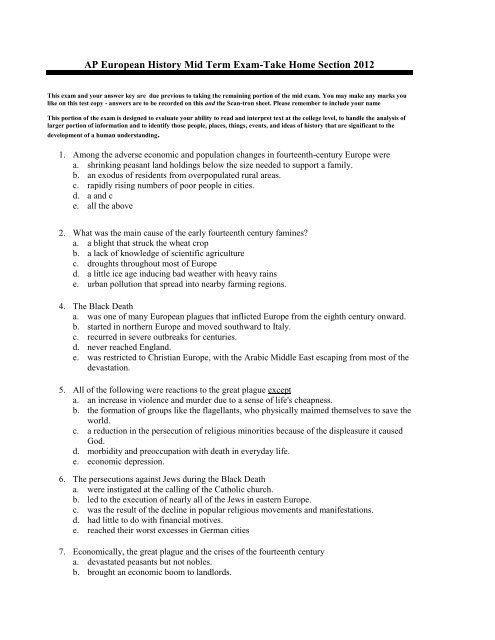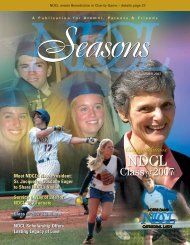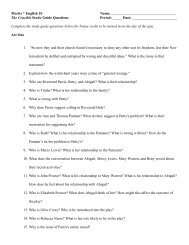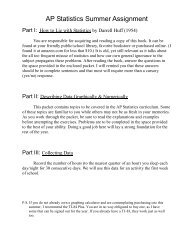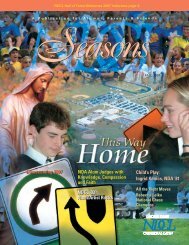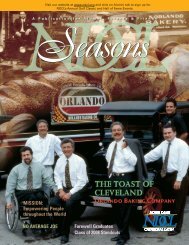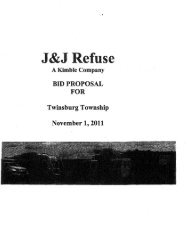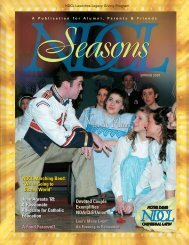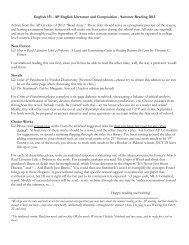AP European History Mid Term Exam-Take Home ... - eSchoolView
AP European History Mid Term Exam-Take Home ... - eSchoolView
AP European History Mid Term Exam-Take Home ... - eSchoolView
Create successful ePaper yourself
Turn your PDF publications into a flip-book with our unique Google optimized e-Paper software.
<strong>AP</strong> <strong>European</strong> <strong>History</strong> <strong>Mid</strong> <strong>Term</strong> <strong>Exam</strong>-<strong>Take</strong> <strong>Home</strong> Section 2012This exam and your answer key are due previous to taking the remaining portion of the mid exam. You may make any marks youlike on this test copy - answers are to be recorded on this and the Scan-tron sheet. Please remember to include your nameThis portion of the exam is designed to evaluate your ability to read and interpret text at the college level, to handle the analysis oflarger portion of information and to identify those people, places, things, events, and ideas of history that are significant to thedevelopment of a human understanding.1. Among the adverse economic and population changes in fourteenth-century Europe werea. shrinking peasant land holdings below the size needed to support a family.b. an exodus of residents from overpopulated rural areas.c. rapidly rising numbers of poor people in cities.d. a and ce. all the above2. What was the main cause of the early fourteenth century famines?a. a blight that struck the wheat cropb. a lack of knowledge of scientific agriculturec. droughts throughout most of Europed. a little ice age inducing bad weather with heavy rainse. urban pollution that spread into nearby farming regions.4. The Black Deatha. was one of many <strong>European</strong> plagues that inflicted Europe from the eighth century onward.b. started in northern Europe and moved southward to Italy.c. recurred in severe outbreaks for centuries.d. never reached England.e. was restricted to Christian Europe, with the Arabic <strong>Mid</strong>dle East escaping from most of thedevastation.5. All of the following were reactions to the great plague excepta. an increase in violence and murder due to a sense of life's cheapness.b. the formation of groups like the flagellants, who physically maimed themselves to save theworld.c. a reduction in the persecution of religious minorities because of the displeasure it causedGod.d. morbidity and preoccupation with death in everyday life.e. economic depression.6. The persecutions against Jews during the Black Deatha. were instigated at the calling of the Catholic church.b. led to the execution of nearly all of the Jews in eastern Europe.c. was the result of the decline in popular religious movements and manifestations.d. had little to do with financial motives.e. reached their worst excesses in German cities7. Economically, the great plague and the crises of the fourteenth centurya. devastated peasants but not nobles.b. brought an economic boom to landlords.
c. caused only minor changes in agricultural practices.d. raised wages because of a scarcity of labor.e. had little impact.8. Post-plague socioeconomic relations between rich and poor in Europea. improved noticeably as Christians sought to make peace with one another to please anangry God.b. quickly resumed their pre-plague character.c. suffered as richer nobles rebuffed the sincere efforts of peasants to maintain the manorialsystem.d. improved radically as the economy entered into a period of sustained prosperity.e. got much worse as materially threatened nobles began to regard wealthier peasants andtheir new-found desires for meat and wine with utter contempt.9. The French government and aristocracy responded to the Jacquerie bya. drafting the rebels into the army.b. standing back and letting it run its course.c. negotiating a settlement with its leaders.d. massacring the participants.e. renouncing their historic privileges.10. The English Peasants' Revolt of 1381a. was caused by the rising economic expectations of ordinary people.b. was brutally crushed by the nobles.c. succeeded in getting the government to agree to the peasants' demands.d. gained long-term results for the peasants.e. led to the end of the Hundred Years' War.11 One decisive advantage that England had at the beginning of the Hundred Years' War wasa. cannons.b. lances.c. credit financing.d. longbow.e. castles.12. In the conduct of the Hundred Years' War, a sure sign of feudalism's decline was thea. inability of feuding kings to raise armies of knights.b. reliance of kings on artillery as the main component of royal armies.c. decisive role of peasant foot soldiers rather than mounted knights.d. clear intention of kings to destroy the estates of their own vassals.e. use of heavier armor and larger horses.13. France's "first woman of letters" wasa. Pope Joan.b. Joan of Arc.c. Heloise.d. Christine de Pizane. Simone de Beauvoir.14. Politically, France by the end of the fourteenth century sawa. the dominance of the Estates-General in determining government policy and administeringtaxes.
. no new forms of government revenue due to royal opposition.c. chaos and civil war as rival noble factions fought for control of the realm.d. new rights of political participation in the Parlement of Paris for poor townspeople.e. strongly unified as a result of the leadership of Joan of Arc.15. Politically, Italy and Germany were similar in the fourteenth century becausea. the plague had equally devastated both regions.b. both regions failed to develop a centralized monarchical state.c. local nobles and town governments lost much influence over reigning kings.d. mercenary captains usurped royal authority and ruled violently.e. both had begun to develop industrial economies.16. The Italian condottieri werea. political leaders supporting the pope.b. bankers with branch banks throughout much of Western Europe.c. merchants working in northern Europe.d. reformers within the Catholic Church.e. leaders of mercenary bands, occasionally ruling as military dictators.17. The conflict between Pope Boniface VIII and Philip IV of France began when Philipa. tried to end corruption in the French Church.b. tried to buy the papacy for his nephew, Henry.c. taxed churchmen without the Church's permission.d. denied the existence of witches.e. authorized a French translation of the Bible.18. One overall result of the Great Schism was toa. put an end to the church's previous financial abuses.b. badly damaged the faith of many Christian believers.c. rejuvenate Christianity as it had been on the decline throughout Europe.d. end the abuse of pluralism.e. reinforce the faith of true rather than false Christians.19. The fifteenth century theologian who claimed that reason could not prove spiritual truth wasa. Aquinas.b. Abelard.c. Magnus.d. Occam.e. Eckhart.20. What was Boccaccio's most famous work?a. The Divine Comedyb. The Sonnetsc. The Princed. Spiritual Exercisese. The Decameron21. Dante's Divine Comedya. is considered a synthesis of medieval Christian thought.b. was one of the last fourteenth-century works to be written in Latin.
c. lashed out at the "barbarity" of the classical tradition.d. attacked the science of Aristotle, the Holy Roman Emperor, and the Catholic church.e. was the greatest prose work of the early Renaissance.22. All of the following are correct about Petrarch except hea. was a Florentine.b. wrote in the vernacular.c. wrote sonnets in Latin.d. perfected the sonnet form.e. wrote love poems to Laura.23. The most revolutionary of thirteenth and fourteenth-century inventions was/werea. the printing press.b. paper.c. eyeglasses.d. clocks.e. telescope.24. The Italian Renaissance was primarilya. a mass movement of the peasants.b. characterized by a preoccupation with religion.c. a product of rural Italy.d. a recovery or rebirth of antiquity and Greco-Roman culture.e. a religious reform movement.25. The wealth of the northern Italian cities that funded the Renaissance was gained mostly froma. colonization.b. the slave trade.c. agriculture.d. military conquest.e. trade.26. Two key areas of Renaissance technological innovation werea. fireworks and glass making.b. mill construction and hydraulics.c. mining and metalworking, including manufacture of firearms.d. optical instruments and lens grinding.e. the use of the vault and the arch.27. The achievements of the Italian Renaissance were the products ofa. an elite movement, involving small numbers of wealthy patrons, artists, and intellectuals.b. a mass movement in which all sections of society participated and contributed.c. a narrow religious movement directed almost entirely by clerics.d. a political movement in essence controlled mainly by kings.e. foreign inspiration and influence, particularly from Islamic Spain.28.Machiavelli's The Prince advocates that a successful ruler musta. strive to earn the love of his people.b. follow Christian principles in all his endeavors.
c. care for the weak, poor, and helpless.d. kill all opposition immediately.e. act without scruples for the good of the state.29. Humanism's main effect on the writing of history wasa. a stress on God's influence on human events.b. the secularization of historiography and the explanation of change over time.c. anti-Christian attacks on medieval historians.d. an increasing reliance on archaeological evidence.e. stress the importance of non-Western subject matter.30. The development of printing in the fifteenth centurya. pertained predominantly to secular works, as theological works were still done by hand.b. saw the invention of movable type by Nicholas Fabian.c. ensured that literacy and new knowledge would spread rapidly in <strong>European</strong> society.d. made communication and collaborative work between scholars more difficult due tocompetition.e. had little impact until the eighteenth century.31. Which of the following is not true of Northern Renaissance artists?a. They had less mastery of the laws of perspective than many Italian painters.b. The most influential artist was Jan van Eyck.c. There was an emphasis on illuminated manuscripts and wooden panel painting.d. They valued the secular human form as the primary subject of painting.e. They never portrayed the human body.32. The results of the Hundred Years' Wara. reinvigorated and strengthened the French monarchy.b. caused economic turmoil in England.c. temporarily strengthened the nobility in England.d. a and be. all of the above33. Under Ferdinand and Isabella, Spaina. became increasingly corrupt and inefficient.b. saw society become more secular.c. saw Muslim power vanish from the peninsula.d. had little remaining dissension and was thoroughly unified.e. lost its independence to the Valois dynasty of France.34. The northern Christian humanistsa. felt pessimistic about the future of humanity.b. were sophisticated and realistic in their expectations.c. totally rejected the primacy of the Catholic Church.d. doubted that education could solve the world's problems.e. championed the study of classical and early Christian texts to reform the Catholic Church.35. Popular religion in the Late <strong>Mid</strong>dle Ages and Renaissance was marked bya. greater popular belief in the spiritual utility of relics and indulgences.b. outbursts of church burnings to chase away "devil priests."c. efforts to do away with traditional beliefs and practices of the Catholic Church.
d. the rise of several new neo-pagan, polytheistic cults.e. a turning away from religion in favor of Renaissance humanism.36. Concerning the sacraments of the Catholic Church, Luthera. accepted all seven.b. rejected all of them except baptism and communion, or the Lord's Supper.c. claimed marriage as the only true sacrament.d. eliminated extreme unction.e. eliminated only clerical celibacy.37. Although Charles V had many adversaries, his chief concern during his reign wasa. Henry VIII of England.b. Ludwig II of Bavaria.c. Charles XII of Sweden.d. Francis I of France.e. Pope Clement VII.38. The Religious Peace of Augsburg settled the Lutheran problem by adopting the principle thata. north of the Main river would be Lutheran, below it Catholic.b. each territory would hold elections to determine its religion.c. there would be religious toleration throughout Germany.d. Protestants would accept the authority of the papacy.e. the ruler of each territory determined the religion there.39. England's break with the Roman church became official with the passage of thea. Act of Union.b. Six Articles.c. Act of Toleration.d. Act of Succession.e. Act of Supremacy.40. England's Queen Elizabeth could best be described as aa. pious Catholic.b. fervent Calvinist.c. committed Lutheran.d. passionate Puritan.e. moderate Protestant.41. The Reformation successfully abolished all of the following from the lives of Europe'sProtestant community except fora. indulgences.b. the celebrations of religious saints' days.c. taverns.d. clerical celibacy.e. monasteries and nunneries.42. The Council of Trenta. compromised with the Protestants on the doctrine of Justification by Faith.b. agreed with most Protestants that there were only two sacraments.c. reaffirmed traditional Catholic beliefs against the Reformation.d. asserted the importance of doctrine over ritual.
e. placed church councils above the authority of the popes.43. The Edict of Nantes was all of the following except ita. was an acknowledgment that Catholicism was the official religion in France.b. expelled the Huguenots from France.c. recognized the rights of the Protestant minority.d. was a political decision.e. was an attempt to reduce religious violence in France.44. The importation of silver from the New World to Spain resulted ina. the Industrial Revolution.b. the Commercial Revolution.c. deflation.d. stagflation.e. inflation.45 The primary motive for <strong>European</strong> exploration during the Renaissance wasa. social, to relieve the population pressure on Europe.b. religious, to spread the Gospel.c. psychological, the quest for new experiences to transform a dull existence.d. military, to provide new bases for an army.e. economic, the desire for precious metals and new areas for trade.46. . The Italian merchant whose tales of the court of Kublai Khan popularized China in Europewasa. Daniel Defoe.b. Amerigo Vespucci.c. Marco Polo.d. Leonardo Bruni.e. Jacques Cour.47. . Portugal became the early leader in <strong>European</strong> expansion largely througha. direct trade policies with China.b. defeating Muslim opposition in establishing trade opportunities with India.c. spending all its wealth on ships and manpower.d. winning the race of exploration to the New World.e. defeating the Spanish and becoming the first <strong>European</strong> nation to colonize Africa.48. The development of a Portuguese maritime empire encompassing Malacca and the MalayPeninsula was achieved, in part, througha. ruthless and murderous attacks on Arab settlers in the region.b. the negotiation of four commercial treaties with Arab traders.c. scrupulous business practices with local residents.d. massive bribery to local Arab overlords.e. peaceful diplomacy between equals.49. Spanish expansion and exploration of the New World was best exemplified bya. the first circumnavigation of the globe by Amerigo Vespucci.b. the conquest of the Aztec Empire by Cortés.
c. the conquest of the Incas by Magellan.d. Pizarro's rounding of South America in 1519.e. da Gama's arrival in India in 1498.50. The Treaty of Tordesillas divideda. the Spice Islands between Portugal and the Dutch Republic.b. South Africa between the English and the Dutch.c. the New World between Spain and Portugal.d. the North Atlantic between England and France.e. the South Pacific between Spain and the Dutch Republic.51. Between the sixteenth and the nineteenth centuries, the number of African slaves shipped tothe New World is estimated ata. one million.b. two million.c. five million.d. ten million.e. twenty-five million.52. The mainland states of Southeast Asia had better success in resisting <strong>European</strong> encroachmentthan did the Spice Islands and Malay states becausea. they had greater natural resources desired by the <strong>European</strong>s.b. they were more cohesive politically with strong monarchies.c. the <strong>European</strong>s were not aware of their existence.d. they were Christians, and the <strong>European</strong>s never bothered their fellow Christians.e. they were allied to China, which gave them military support against the <strong>European</strong>s.53. India's Mughal dynasty wasa. Hindu in religion.b. Buddhist in religion.c. Mongol in origin.d. successful in expelling the British East India Company.e. long native to the Indian subcontinent.54. The first <strong>European</strong> nation to establish formal diplomatic relations with China wasa. England.b. Russia.c. the Dutch.d. Venice.e. Portugal.55 . The first permanent English settlement in North America wasa. Massachusetts Bay.b. Plymouth.c. New York.d. Jamestown.e. Quebec.56. One of the major economic problems of the sixteenth century in Europe wasa. deflation.
. inflation.c. stagflation.d. depression.e. a population decline which led to massive unemployment.57. The inflation of the sixteenth and early seventeenth centuriesa. severely hampered commercial expansion.b. caused a shift in industry to urban locales.c. caused a decline in the standard of living for wage earners and those on fixed incomes.d. was caused largely by a declining labor force.e. was the result of too little money in circulation.58 . The witch hunts of the sixteenth and seventeenth centuriesa. came out of the social unrest deriving from the shift from individualism to communalism.b. were often directed against old single womenc. were generally directed only at people who denied that they were religious.d. were primarily restricted to rural areas.e. were minimal in comparison to the late <strong>Mid</strong>dle Ages.59 . Cardinal Richelieu understood that, in Louis XIV's France, the most important roadblock tobuilding a strong monarchy wasa. the rising cost of warfare.b. witchcraft.c. resistance by the great nobles.d. armed uprisings by workers in Paris.e. peasant revolts in the countryside.60 . Absolutism meansa. the real power in any state must be religious and exercised by the church.b. ultimate authority rests solely in the hands of a king who rules by divine right.c. subordinate powers have an absolute right to advise the king on conducting the affairs ofstate.d. no matter how humble, male citizens have an absolute right to participate in politics.e. rule by a secular dictator, justifying his/her authority by supposedly serving the people.61. The economic policies of Jean-Baptiste Colbert, Louis XIV's controller general of financesa. were noted for their innovation and originality.b. used new accounting practices to take the tax burden off the peasants.c. were based on the economic theory of mercantilism that stressed government regulation ofeconomic affairs to benefit the state.d. gave Louis the large surplus in the treasury needed to carry out his wars.e. could best be described as laissez-faire.62. Louis XIV used his palace at Versailles toa. dominate the nobility and display his grandeur.b. putter around in the garden and enjoy nature.c. earn money by centralizing the marketplace.d. get away from politics and spend time with his family.e. provide a spiritual sanctuary from a troubled world.63. Which of the following exerted the most influence on Italy by the eighteenth century?
a. Franceb. Englandc. Spaind. the Ottoman Empiree. Austria64. Russian society in the seventeenth centurya. witnessed the reign of Ivan the Terrible.b. witnessed profound religious reforms in the Russian Orthodox church.c. was characterized by a highly oppressive system of serfdom.d. saw the rise of the merchant class to power.e. saw the end of serfdom and the emergence of a prosperous free peasantry.65. Scandinavia in the seventeenth and eighteenth centuries witnesseda. Denmark expand so as to dominate the Baltic.b. Sweden become a second-rate power after the Great Northern War.c. Sweden and Denmark join forces to defeat and occupy Poland in 1660.d. the economic dominance of Sweden over the rest of northern Europe.e. the conquest of Sweden by Norway.66. The "sleeping giant" of Eastern Europe in the first half of the seventeenth century wasa. Russia.b. Austria.c. Poland.d. Greece.e. the Ottoman Empire.67. The "Golden Age" of the Dutch Republic in the seventeenth century witnesseda. William of Orange become king in 1672.b. the economic prosperity of the United Provinces ruined by series of wars late in thecentury.c. the temporary weakening of the States General.d. b and ce. all of the above.68. The Petition of Right (1628), among other things,a. stated that the King of England was elected.b. maintained that the King could pass no new tax without the consent of Parliament.c. restored order in the English military.d. made the English monarchy purely ceremonial.e. made the Anglican Church the "established" church.69. The "Glorious Revolution" in 1688 in England was significant fora. restoring Charles II and the Stuart dynasty to power.b. bloodlessly deposing James II in favor of William of Orange.c. returning England to a Catholic commonwealth.d. Parliament's establishment of a new monarch through a series of bloody wars.e. the abolishment of the monarchy in favor of a republican "commonwealth."
70. The English Bill of Rightsa. laid the foundation for a constitutional monarchy.b. resolved all of England's seventeenth-century religious questions.c. reaffirmed the divine-right theory of kingship while limiting the king's power.d. confirmed the king's right to raise standing armies without parliamentary consent.e. stated that taxes could only be approved by the House of Lords, not the House ofCommons.71. Thomas Hobbesa. felt that man was suited best to be in a pristine state of nature, without governmentinterference.b. stated that mankind was animalistic, and needed a strong government to maintain socialorder.c. was a firm believer in democracy.d. said that the best form of government was a theocracy.e. argued in favor of revolution when the ruler broke the social contract.72. John Locke was responsible fora. synthesizing previous doctrines on international law.b. the idea of society as being in a constant state of war.c. advocating political democracy for the entire populace.d. emphasizing the social contract between the people and government.e. disestablishing the Church of England.73. The Scientific Revolution of the seventeenth centurya. was stimulated by a revived interest in Galen and Aristotle.b. directly resulted from reaction and revolt against the social and historical conditions of the<strong>Mid</strong>dle Ages.c. was largely due to a monastic revolution.d. although an innovative phase in western thinking, was based upon the intellectual andscientific accomplishments of previous centuries.e. was a complete break with the past.74. All of the following are considered possible influences and causes of the Scientific Revolutionexcepta. the practical knowledge and technical skills emphasized by sixteenth-century universities.b. mathematical and naturalistic skills of Renaissance artists.c. the Hermetic belief in magic and alchemy.d. the humanists' rediscovery of Greek mathematicians and thinkers.e. the inspired work of a few intellectuals.75. The general conception of the universe before Copernicus was thata. it was orderly with heaven at the center and the earth circling around it.b. the earth was the stationary center and heavenly spheres orbited it.c. the earth rested on the shell of a giant tortoise.d. it could not be revealed according to God's will.e. the world was flat.76. The greatest achievements in science during the sixteenth and seventeenth centuries came inwhat three areas?
a. astronomy, medicine, and mechanics.b. astronomy, botany, and chemistryc. biology, mechanics, and ballisticsd. engineering, physics, and dentistrye. biology, surgery, and astronomy77. Following upon Copernicus's heliocentric theoriesa. Johannes Kepler used data to derive laws of planetary motion that confirmed Copernicus'sheliocentric theory but that showed the orbits were elliptical.b. Kepler observed the heavens and proved that planetary motion was circular around thesun.c. Kepler used magic to prove that the earth moved in a manner based on geometric figures,trying to bring harmony of the human soul into alignment with the universe.d. Galileo and Kepler demonstrated that the motion of the planets is steady and unchanging.e. Kepler discovered the three laws of thermodynamics.78. Tycho Brahe contributed to the advance of astronomy bya. working out the theory of inertia.b. making accurate observations of the planets.c. calculating the pull of gravity on the tides by the moon.d. calculating the distance to the sun.e. inventing the astrolabe.79. Johannes Kepler was the first astronomer to show thata. the planets are made of earth-like material.b. planetary orbits are elliptical.c. the stars are immensely far away.d. everything is an illusion.e. the moon orbits around the earth.80 . Galileo's Dialogue on the Two World Systems was really an attempt toa. embarrass Copernicus.b. support Copernicus through a publication in Italian accessible to a wide audience.c. attack Luther and Protestant theological restrictions on scientific inquiry.d. apologize to the church for earlier theories he now saw as mistaken.e. oppose the dogma and doctrine of the Catholic Church.81 . Isaac Newton's scientific discoveriesa. were resisted more in his own country, England, than in the rest of Europe.b. although readily accepted in his own country, were resisted on the continent.c. were modern in their removal of God from universal laws.d. were among the first to be printed in a language other than Latin.e. were initially condemned by the Church of England and the Archbishop of Canterbury.82. Among the following, who is not associated with major changes in sixteenth and seventeenthcenturyscientific research?a. Vesaliusb. Harveyc. Paracelsus
d. Galene. Boyle83. William Harvey's On the Motion of the Heart and Blood refuted the ideas ofa. the immune system being associated with the pancreas.b. the brain stem being disconnected from the brain.c. the independent functioning of the lymph system.d. herbal healing.e. the liver as the beginning point of the circulation of blood.84. The scientist whose work led to the law that states that the volume of a gas varies with thepressure exerted upon it and who argued that matter is composed of atoms, later known as thechemical elements, wasa. William Harvey.b. Paracelsus.c. Andreas Vesalius.d. Robert Boyle.e. Antoine Lavoisier.85. The philosophy of René Descartesa. stressed a separation of mind and matter.b. stressed a holistic universe of mind and matter devoid of a creator-God.c. saw the material world as a living thing containing the human essence.d. would not have a wide influence upon Western thought until the nineteenth century.e. was condemned by the government of the Dutch Republic.86. The Foundation of Francis Bacon's methodology wasa. inductive reasoning.b. speculative reasoning.c. deductive reasoning.d. triangulation.e. nonsense.87. For Blaise Pascal, humansa. could know infinity through reason.b. were the summation of all things.c. could only understand that which is revealed to them by the Bible.d. were uniquely separate from the rest of the animal world.e. could not understand infinity, only God could.88. Science became an integral part of Western culture in the eighteenth century becausea. people perceived it to be rationally superior to other belief systems.b. its mechanistic nature was popular with the lower classes.c. the victory of radical political groups, such as the Levellers, following the PuritanRevolution encouraged freedom of expression.d. it offered a new means to make profits and maintain social order.e. it allowed an alternative religious belief system to that of Christianity.89. The scientist-philosopher who provides a link between the scientists of the 17th century andthe philosophes of the next was
a. Voltaire.b. Diderot.c. Hume.d. Beccaria.e. Fontenelle.90. <strong>European</strong> intellectual life in the eighteenth century was marked by the emergence ofa. anti-Semitism and sharper persecution of minorities.b. secularization and a search to find the natural laws governing human life.c. sophism and the mockery of past traditions.d. monastic schools and medieval modes of training religious thinkers.e. the complete separation of church from state.91. The French philosophesa. flourished in an atmosphere of government support.b. sought no extension of Enlightenment to other disciplines.c. were literate intellectuals who meant to change the world through reason and rationality.d. supported state censorship of ideas contrary to their own.e. were widely influenced by Jean Jacques Rousseau and his emphasis upon emotions.92. In The Spirit of the Laws, Montesquieu argued that the best political system in a modernsociety is one wherea. the legislature exercises absolute and unlimited power.b. the king exercises absolute and unlimited power.c. power is divided between the three branches of government.d. the nobility is uninvolved.e. all government resources are focused on military power.93. Deism is the belief thata. religion is fairy tales to frighten the superstitious.b. if God exists, he has no interest in the world.c. God created the universe but does not actively run itd. a transcendent spirit controls every event.e. praying matters.94. The purpose of Diderot's encyclopedia, according to him, was toa. get the uneducated masses to respect authority.b. usher in God's kingdom on earth.c. dispute the claims of science.d. exacerbate the hedonism of his peers.e. change the general way of thinking.95. Adam Smith believed that governmenta. should not interfere in people's economic decisions.b. set prices across the board to maintain stability.c. should encourage people to share and help each other.d. has a responsibility to the people to manage the economy.e. is not necessary and should be eliminated entirely.96. Rousseau's influential novel, Emile, deals with these key Enlightenment themes:a. proper child rearing and human education
. the best roles for women in making modern societyc. the necessity of church marriage and reform of church teaching on this sacramentd. the abolition of the pope's restrictions on religious practices and the content of sermonse. the evils of child abuse.97. The strongest statement and vindication of women's rights during the Enlightenment was madebya. Mary Wollstonecraft.b. Beatrice Williams.c. Mary Astell.d. Princess Amelia of Austria.e. Maria Cavendish.98. The Jews of eighteenth-century Europea. were assimilated into French society through the unanimous calls of the philosophes forintegration.b. were most persecuted in France and Poland.c. were most free in participating in banking and commercial activities in tolerant cities.d. won the right to publicly practice of their religion in Austria with Joseph II's TolerationPatent of 1781.e. were restricted to ghettos in all <strong>European</strong> states.99. France in the eighteenth centurya. thrived under the strong leadership of Louis XV and Louis XVI.b. suffered from severe economic depression throughout the century.c. was torn apart by a series of civil wars.d. lost an empire while acquiring a huge public debt.e. brought back the Estates General during the reign of Louis XV.100. A continuing trend throughout eighteenth-century Prussia wasa. the uncontrollable growth of the royal state bureaucracy.b. the social and military dominance of the Junker nobility.c. an avoidance of military entanglements, especially under Frederick the Great.d. social mobility for the peasants through the civil service.e. the emergence of the bourgeoisie as the dominant class of society.101. In a sincere effort to reform his domains typical of enlightened rulers, the Austrian emperorJoseph II issueda. three new court circulars on improved operations for the imperial bureaucracy.b. 6,000 decrees and 11,000 new laws.c. 150 new ranks of imperial bureaucrats.d. at least 350 imperial decrees for the reform of judicial practice in Hungary.e. an edict separating the Austrian government from any connection with the CatholicChurch.102 . Catherine the Great of Russiaa. followed a successful policy of expansion against the Turks.b. instigated enlightened reforms for the peasantry after the revolt of Emelyn Pugachev.c. weakened the nobility with her extensive enlightened reforms.d. successfully eliminated the power of the Duma.e. established a permanent political and military alliance with revolutionary France.
103.. Enlightened absolutism in the eighteenth centurya. could never completely overcome the political and social realities of the time.b. was most successful in the strengthening of domestic diplomatic practices.c. successfully undermined the interests of the <strong>European</strong> nobility.d. was unable to implement legal reforms in many <strong>European</strong> states.e. was such a general failure that divine right monarchy soon replaced it.104. Which war do some historians regard as the first world war?a. War of the Austrian Succession.b. The French and Indian War.c. The Seven Years' War.d. Queen Anne's War.e. The Crimean War.105. Which war do some historians regard as the first world war?a. War of the Austrian Succession.b. The French and Indian War.c. The Seven Years' War.d. Queen Anne's War.e. The Crimean War.106. Which one of the following non-native, imported products allowed Irish peasants to survive onthe small plots of land left to them by English landlords?a. fish.b. tomatoes.c. wheat.d. rice.e. potatoes.107. Europe's unequal social organization in the eighteenth century wasa. determined by the division of society into traditional orders.b. deemed contrary to Christian teaching.c. least apparent in Prussia.d. abolished in Britain by Parliament in opposition to the king.e. became dramatically more equal as the century progressed.108. The special legal privileges of the <strong>European</strong> nobility included all of the following except:a. judgment by peers.b. immunity from severe punishment.c. exemptions from most forms of taxation.d. guarantees against becoming poor.e. access to military and civil offices.109. The Constitution of the United States of 1789a. was a revision of the Articles of Confederation.b. was seen by <strong>European</strong> liberals as a utopian document that would never last.c. created a republic in which the branches of government provided checks on one another.d. had no real impact on the French Revolution.e. failed, and was soon replaced by the Articles of Confederation.
110. The most immediate cause of the French Revolution wasa. the government's failure to resolve its debts and other economic problems.b. the blocking of attempted reforms by the French Parlements.c. the radical calls of the philosophes for reform.d. Louis XVI's rejection of the cahiers de doléances.e. violent uprisings by the common people who were demanding political and economicequality.111. Compared to the American Revolution, the French Revolution wasa. less violent.b. less radical.c. more influential in Europe as a model of rebellion.d. quickly over.e. was entirely a movement of the masses, led by faceless individuals.112. The controversy over voting by order versus voting by head in the Estates-General sawa. the nobles of the robe advocate voting by head.b. the "lovers of liberty" effectively block voting by head.c. Abbé Sieyè's call for the expulsion of the Third Estate from the Estates-General.d. the Third Estate joining the Second Estate in abolished the First Estate of the clergy.e. the Third Estate respond by forming a "National Assembly."113. The Declaration of the Rights of Man and Citizen guaranteeda. free or affordable food for the poor.b. equality under the law for all French men.c. equality under the law for all French men and women.d. nothing.e. the right to vote for all French men.114. The chief accomplishment of the National Convention wasa. creation of the revolutionary calendar.b. preservation of the revolution from being destroyed by foreign enemies.c. creation of the Directory.d. the establishment of the National French School System.e. defeat of the counter-revolutionaries led by the Bourbon family in southern France.115. All of the following are true about Napoleon and his career before 1799 excepta. he was initially disliked by his fellow soldiers.b. he made rapid progress and achieved the status of a general even before the Revolution.c. he read a great deal of military history.d. he saved the National Convention from the Parisian mob in 1795.e. he married the widow of a guillotined general.116. Which of the following statements best applies to Napoleon's domestic policies?a. Much autonomy was given to the provincial departments as the previous system ofprefects was overhauled.b. His "new aristocracy" was actually little different from the old, as it was based onprivilege and wealth.c. His Civil Code reaffirmed the ideals of the Revolution while creating a uniform legal
system.d. As a devout Catholic, he reestablished Catholicism as the official state religion.e. He abolished most of the civilian bureaucracy, preferring to govern by military rule.117. Napoleon met his final defeat at the Battle ofa. Leipzig.b. Borodino.c. Trafalgar.d. Austerlitz.e. Waterloo.


